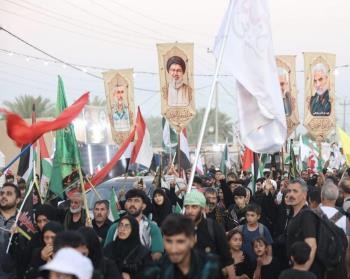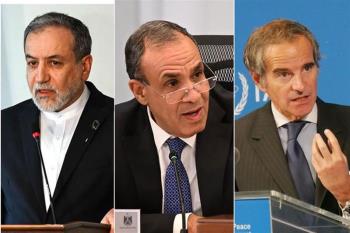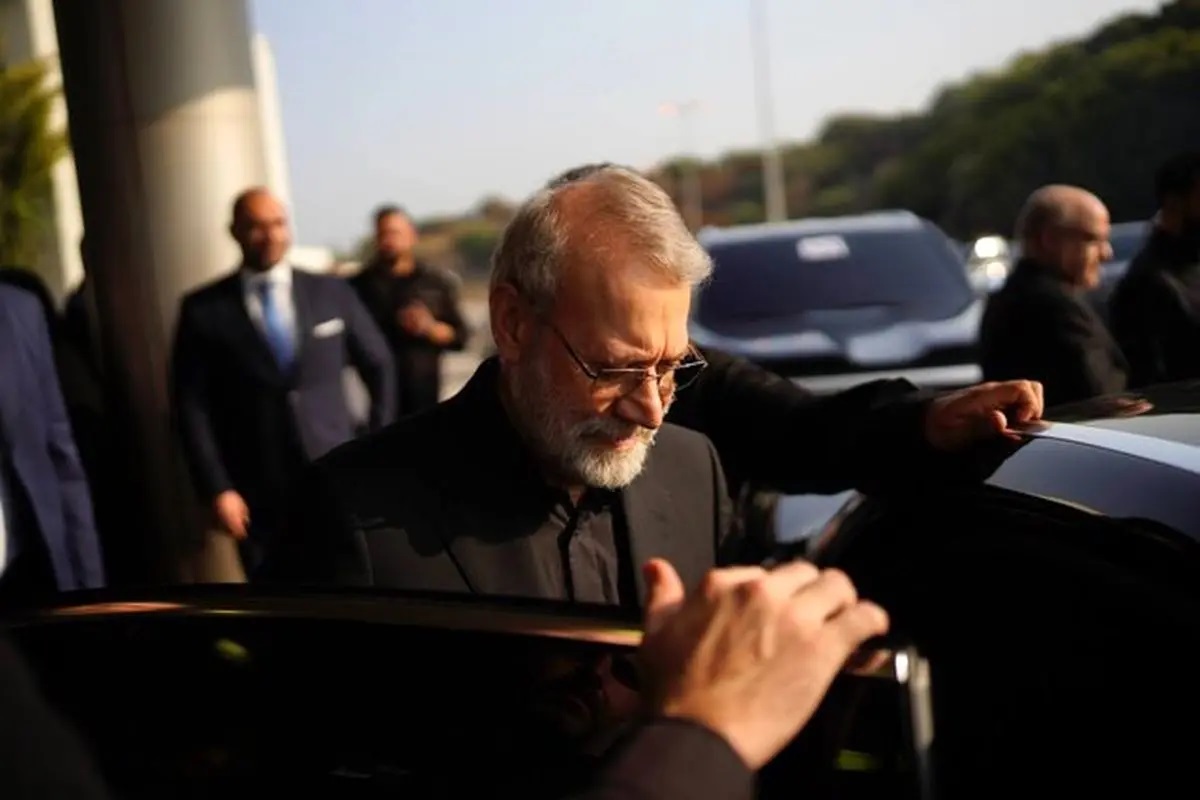Alwaght- Shortly after being appointed secretary-general of Iran’s Supreme National Security Council, Ali Larijani has launched a series of diplomatic moves. Following his recent visit to Moscow, where he held talks with Russian officials, he has now embarked on a tour of Iraq and Lebanon. This trip takes on added significance as it coincides with escalating US and allied actions against resistance groups in the region.
A visit to reinforce the western gate
In his Iraq trip, Larijani had a busy working plan; from meeting senior Iraq officials to taking part in Arbaeen ceremony and following the situation of Iranian pilgrims in Iraq for the religious congregation.
But the most important part of Larijani's trip was definitely the signing of the Iran-Iraq Security Cooperation MoU, which was reached between the two countries two years ago and the process of its implementation has also begun since then.
Commenting on the significance of security cooperation between the two countries and the role of this agreement in strengthening it, Larijani said: "The security agreement between Iran and Iraq actually provides a basis for sustainable security for both countries. We hope that this agreement will be fully implemented and that the various security agencies will follow up on it. Also, a mechanism has been considered to monitor its implementation, which God willing will contribute to security of the two countries."
The most important terms of the Iran-Iraq security agreement, which was signed on March 19, 2023 by then Secretary of the Supreme National Security Council Ali Shamkhani, and National Security Advisor Qassem al-Araji in the presence of Iraqi Prime Minister Mohammad Shia Al-Sudani, was the end of the presence of terrorists and anti-Iranian elements in Iraq's Kurdistan region. The text of the Iran-Iraq security agreement has not yet been published, but according to the announcement of Iraqi government spokesman Bassem al-Awadi, Tehran and Baghdad have signed an agreement to prevent the movement of Kurdish terrorists from Iraq to Iran, hand over wanted individuals, and disarm and dismantle their camps. The most important of these groups are the Democratic Party of Iranian Kurdistan, the Komalah party and the PJAK, which are present in the north of Erbil province and the east of Sulaymaniyah province.
Iran and Iraq share a long common border of about 1,450 kilometers, more than 500 kilometers of which is with the Iraqi Kurdistan region. Therefore, it is quite clear that Iraq has a very important and sensitive position in the security environment surrounding Iran and is considered, in a way, Iran's security gateway to the west.
Activities of anti-Iranian terrorist groups, mainly based in Iraq's Kurdistan and especially Sulaymaniyah, had always posed a challenge to the Iranian security, particularly the border regions. In the new situation and especially after the 12-day war with Israel, the potential threats by these groups to Iranian stability and security should should be focused on more than ever and it can be said that Larijani's visit to Iraq in this period of time is meant to pursue this security priority.
A large part of the Israeli assassination operations and attacks on military and civilian sites and the country's infrastructure during this war were carried out by Mossad agents and their spies and mercenaries, and the experience of the past years has shown that the western borders and the mercenary activities of the groups have been one of the main routes for transferring weapons, equipment and spies to the country's territory. Estimates by the intelligence and security services and strategic analyses by research centers have stated that one of the main goals of the US and the Israel, both in the 12-day war and for the future, in confronting Iran is to intensify separatist activities and create internal chaos. Therefore, confronting these activities and reaching agreements with Iraq to check the presence of the terrorists groups on the Iranian borders is now among the priorities of Tehran.
In this connection, in a meeting with al-Araji, Larijani expressed his happiness with the Iraqi side's determination to respect Iran's sustainable security, saying: "During the talks, I felt that this determination exists among Iraqi friends, and we are also determined, and an agreement on this issue will greatly contribute to the growth of our cooperation with Iraq in various sectors."
On the other hand, the 12-day war proved that Iran's concerns and warnings about the conspiratorial and destabilizing US military presence in Iraq and its obstacles to Iraq's defense independence, especially in the field of air defense equipment and control over the skies, facilitate Israel threats to Iran's territorial security. The Israeli air force carried out a large part of its attacks on Iranian territory through the air corridor that the US had opened from Jordan, Syria, and Iraq. In many cases, Israeli fighter jets even fired their missiles from the skies of Iraq at targets in Iranian territory as they fear Iranian air defense capabilities.
Another issue is focus on common threats that necessitate the cooperation of the two countries. After overthrow of Bashar al-Assad government in Syria, the Arab countries has been suffering from growing security crises and instability under the rule of the takfiri groups of Hayat Tahrir Al-Sham (HTS) and the outlook of security in this country is shrouded in mystery in the shadow of Israeli military intervention and the rising ethnic-sectarian clashes.
Meanwhile, the experience of the emergence of ISIS and the dispatch of terrorists from Syrian soil has worried Iraqis about developments in the neighboring country. However, the moves that have been made in recent months by the White House against the Popular Mobilization Forces, which is a powerful security arm for Iraq and was founded in opposition to ISIS in 2014, require greater sensitivity among Iraqi government officials, and this could be part of the talks between Larijani and Iraqi officials.
Message of Larijani's Lebanon visit
As the next stop, Larijani flew to Lebanon that these days is grappling with various challenges and the situation of Hezbollah as Iran's ally is at a decisive point.
Although the coming to power of the new government after a two-year stalemate has revived hopes for the return of peace and stability to the country and for addressing important economic priorities including reconstruction of areas damaged in the 66-day war with the Israeli regime, in recent days, with the controversial move of Joseph Aoun's cabinet to approve a completely American plan to disarm Hezbollah and communicate it to the army, the prospects for Lebanon's political and security stability have once again been plunged into a state of uncertainty.
Hezbollah, which has been the anchor of stability and the force that protects the security of Lebanon's borders against Israeli aggression over the past decades and has practically shouldered the burden of the army's duties, has announced that it will not commit to the cabinet resolution for its disarming and it will not allow this American and Israeli plot against resistance materialize.
In the midst of this unprecedented confrontation between the government and Hezbollah, experts are warning about the consequences of the government's pressure on Hezbollah on the internal stability.
In these circumstances, Larijani's visit is significant from some aspects:
First of all, the Lebanese government's acceptance of Larijani's visit at this time conveys the message that Aoun's government is aware of both its inability to implement the resolution it has approved regarding Hezbollah disarming and its concerns about its critical consequences. Similarly, while the Lebanese foreign minister had recently considered the positions of Iranian officials to be interference in the country's internal affairs, receiving Larijani in Beirut indicates that the heads of state are placing their hope in the role of the Islamic Republic of Iran as a facilitator to get out of the impasse they have fallen into as a result of submitting to the American and Saudi dictates.
The second issue is the declaration of the Islamic Republic's support for maintaining the security, stability, and territorial integrity of all of Lebanon with all its ethnicities and religions, and within the framework of Iran's stable and permanent policy towards developments in this country, and consulting with various Lebanese factions to settle the differences with regard to the current realities in the region and the security threats that the Israeli regime poses to Lebanon's stability. Hezbollah disarming becoming an internal crisis could lead to sectarian conflicts or even civil war, which would play into the hands of Washington and Tel Aviv. Therefore, upon arriving in Beirut, Larijani said the purpose of this trip was to secure Lebanon's interests and adding: "Lebanon's suffering is our suffering. We will stand by Lebanon in all circumstances."
The third issue is the need to protect the unity of the Shiites in this sensitive period, especially as the adversaries are seeking to divide the ranks of the Shiite forces, namely Hezbollah and Amal Movement. So far, Nabih Berri's positions as speaker of parliament and leader of the Amal movement in supporting the legitimacy and benefit of Hezbollah's weapons for Lebanon's security have highly undermined the enemy efforts to disarm Hezbollah.
Finally, after 12-day war, the power and position of each regional actor is redefined and this tour is an effort by Iran to re-establish its presence as a stabilizing actor in the Lebanese equations and assert to the enemies that Beirut remains part of the Axis of Resistance.



























